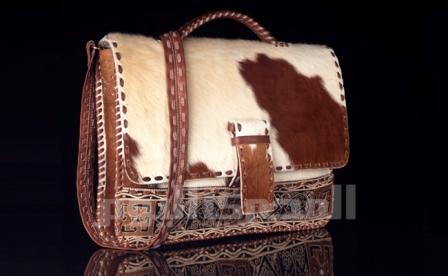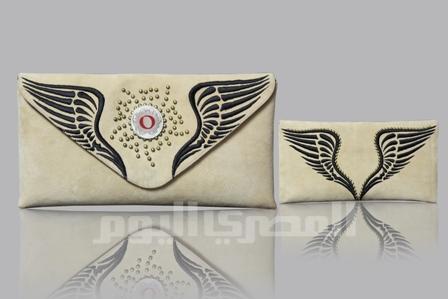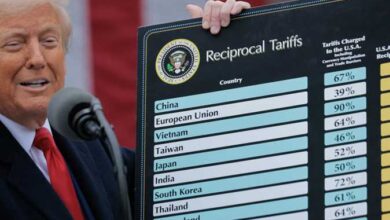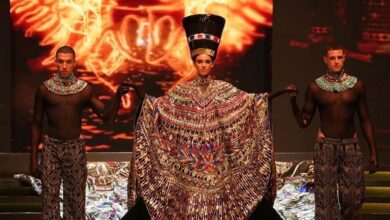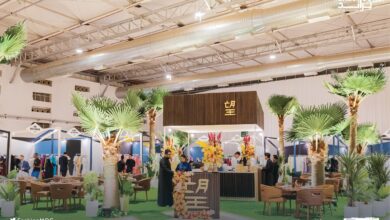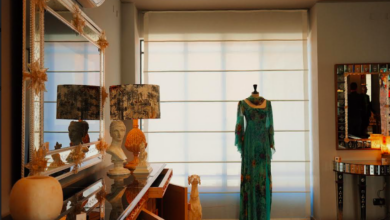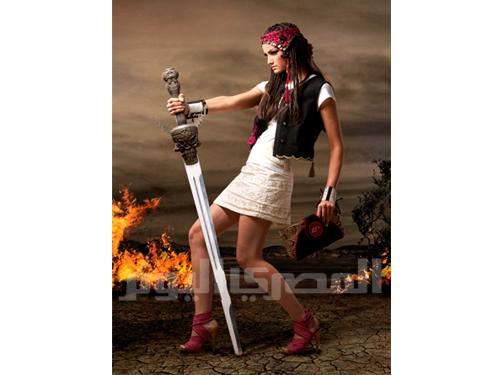
On his website,Abbas Aboul Hassan claims that Fugoura is a warrior princess, a rebel and the descendant of mixed races who through her travels and journeys collects the essence of various cultures and styles.
Right in the middle of Dandy Mall, the hub of high street fashion, Fugoura made her last stop a couple of weeks ago and launched her first showroom. The snug shop features the Spring/Summer 2012 collection of t-shirts, blouses, pants and galabeyas.
Aboul Hassan, the founder and the main designer of Fugoura, launched his first line on 25 January with the first spark of the Egyptian revolution. “Being affiliated with such a historic event has helped the brand a lot,” explains Aboul Hassan. After managing his mother’s showroom, Al-Dokkan, for almost 12 years, the young designer was ready to release his own creation, a fashion line that mixes ethnic with neo-mode.
The showroom reflects the spirit of the designer and his designs; rough rugged stone walls mixed with extremely colorful murals featuring the female warrior holding her sword surrounded by skulls, flowers and peace signs. The word freedom (horreya) adorns the walls along with mythical creatures like unicorns and winged women.
The collection is wide-ranging; it includes all sizes and shapes of embroidered and beaded scarves, embroidered t-shirts that exude comfort and elegance, embroidered mini-skirts, t-shirts, tank tops, galabeyas and harem pants. Ethnic Bedouin stitches, tassels, mother of pearl buttons, and beads take the lead in the new collection.
“All embroidery is handmade — a piece can take up to four days of work,” says Aboul Hassan. Each piece has to reflect the image of the brand and the spirit of the main design. After the latest economic and political changes that the country witnessed, the chief designer of Fugoura revisited his price plan and decreased his mark-up percentage to make the brand more affordable to a wider audience. “The price reduction did not affect the quality of the final product,” affirms the designer.
For years, buying an Egyptian product meant for many losing money due to the cheap quality, says the creator of Fugoura. Nowadays, the creativity of a small group of Egyptian designers is attempting to change that perception. “The ethnic edge mixed with impeccable quality and finishing is a winning card for the Egyptian fashion industry,” explains Aboul Hassan. Aboul Hassan states that a trend began a few years before the revolution with the effort of female Egyptian designers who succeeded in creating a niche for such a product.
The fabrics used are very Egyptian, like cotton, silk, jersey and even Mallas, an Egyptian fabric used in making galabeyas. Most designs are simple and comfortable but the embroidering gives it an edge of elegance and art. Fugoura is especially in love with the Sinai or Arish stitch, widely used in belts and scarves.
Galabeyas and Harem pants are definitely the main pieces within the collection. Aboul Hassan used silk and Mallas for the long and short galabeyas. Jersey and cotton are widely used for Harem pants.
The collection feels like a marriage between a Bedouin woman and a rock star; designs feel familiar yet extremely outside the box. The prices range between LE200 and LE2,000 — definitely on the pricey side, but the good finishing is worth it. If you are looking for a unique piece of clothing that fits nicely and is high-quality, then Fugoura is a good option.

